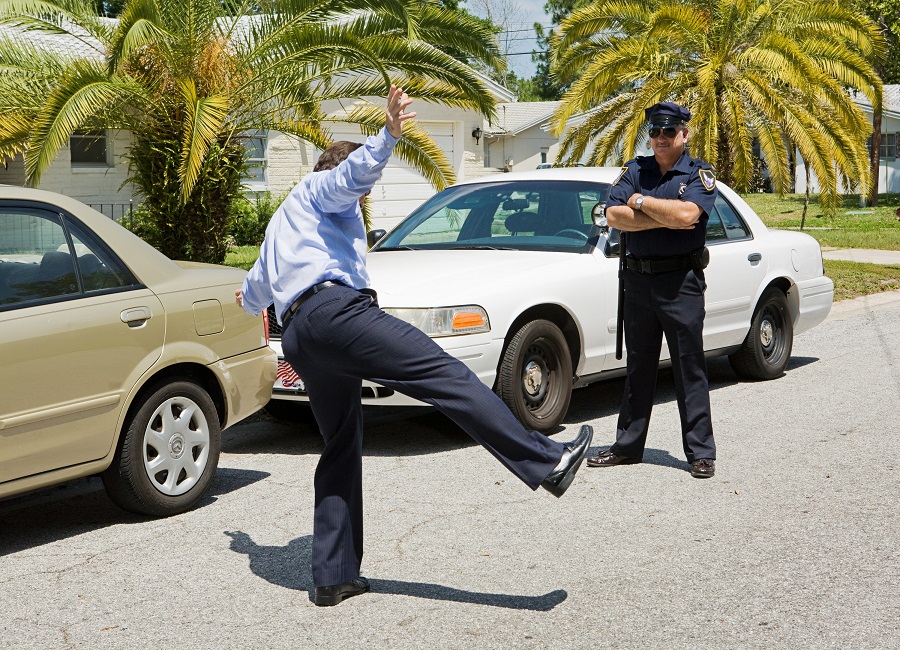How Hoberman-Kelly v. Valverde Forever Changed DUI Testing
In Hoberman-Kelly v. Valverde (2013), the court ruled that suspension of plaintiff’s driver’s license was improper when the officer’s reading of the necessary admonitions was mechanical, and he made no attempt to dispel plaintiff’s confusion as to the right to contact counsel, and when plaintiff stated she would submit to a blood test.
DUI Implied Consent Law
Hoberman-Kelly was arrested on July 30, 2010 by California Highway Patrol Officer M. Perry. At the scene of the DUI investigation, Officer Perry read the preliminary alcohol screen admonition to Hoberman-Kelly and she refused to take a breath test at the scene. Upon being arrested for driving under the influence of alcohol, she was placed in officer’s patrol vehicle and she was read her Miranda rights. In addition, she was advised of the consequences under Vehicle Code section 13353 of failing to submit to a chemical test of her blood alcohol content.
While in the patrol vehicle, Hoberman-Kelly observed a sign on the wall which stated she had a right to make a telephone call. Hoberman-Kelly told the officer she wanted to call her attorney and to make the telephone call to which the sign said she was entitled. Although visibly intoxicated, Hoberman-Kelly made clear that she did not understand why she could not make the phone call to which the sign referred.
Officer Perry at no point acknowledged her request to make a call or made any effort to explain that despite her right to speak to an attorney she was not entitled to do so or to make her call before submitting to the chemical test. Instead the officer continued to read the pre-printed admonition.
The admonition did include the statement that “you do not have the right to talk to an attorney or have an attorney present before stating whether you will submit to a test, before deciding which test to take, or during the test.” However, upon review of the video of the incident, it was evident that Hoberman-Kelly did not hear the admonition and that Officer Perry must have been aware that she did not hear it.
After Perry finished reading the admonition, he asked Hoberman-Kelly whether she would submit to a blood test, to which she responded “all right.” However, Officer Perry stated “that’s a no” and that he would take her reply as a refusal. Hoberman-Kelly immediately shouted in response that she would give a blood test and repeated that she would do so several times. The phlebotomist then promptly administered the blood test without incident.
California DMV Hearing
After an administrative hearing, the Department of Motor Vehicles (DMV) suspended Hoberman-Kelly’s driving privilege for one year for refusing the request to submit to the blood-alcohol test. The DMV hearing officer found that Hoberman-Kelly “refused to take a chemical test and kept insisting she wanted her attorney present. Officer Perry advised her he considered it a refusal and she then stated she would take a blood test. [Hoberman-Kelly’s] opportunity to change her mind to retract her refusal to complete a chemical test had expired because the officer already notified her he considered her responses and actions as a refusal.”
Petition for A Writ Of Mandate
Hoberman-Kelly filed a petition for a writ of mandate in the superior court seeking to vacate the suspension order. Following a hearing at which the court reviewed the entire administrative record, including the video, the court granted the writ and entered an extensive order reading in part as follows: “The ‘fair meaning’ given to Ms. Hoberman-Kelly’s statements is that she is genuinely exasperated and confused by the conflict between her right to counsel as indicated on the wall of the police station and Officer Perry’s implicit and explicit refusal to permit her to call for an attorney. Officer Perry responds by reading the admonition mechanically and makes no effort to explain that the Miranda right does not apply to the chemical tests. Officer Perry also refused Ms. Hoberman-Kelly’s requests that she be permitted to read the admonition herself.
The court explained that it was questionable whether officer-induced confusion would provide a defense in this case if Hoberman-Kelly had refused to take a blood test. On one hand, if the person manifests confusion, “it is incumbent upon the arresting officer to elaborate upon the warning. The arrested person should be explicitly informed that the constitutional rights previously explained to him are not applicable to the decision he must make concerning the three chemical tests, and that he has no right to consult an attorney before making the decision that he will, or will not, submit to one of them.’ “(Goodman v. Orr (1971) 19 Cal.App.3d 845, 885.)
On the other hand, “the rule only requires that the officer erase possible confusion caused the allegedly drunken laymen by the officer’s own statements.’ “(Ibid.) From the video it was apparent that Hoberman-Kelly was confused by the Miranda warning she had received coupled with the sign on the wall advising that she had a right to make a telephone call. While Perry did read the sentence in the form admonition that she had no right to an attorney before deciding whether to take the test or during the test, he did so in what the trial court aptly described as a “mechanical” reading, and what might also be described as purely perfunctory.
It is clear from the video that Perry made no genuine effort to communicate to Hoberman-Kelly “that the constitutional rights previously explained to [her] are not applicable to the decision [she] must make.” Although Hoberman-Kelly repeatedly asked Perry why she could not make a phone call as the sign indicated she could, Perry made no effort to answer her or to explain that she was not entitled to make the call until after she took the blood test.
In summary, an officer is obligated to attempt to clarify an arrested person’s confusion over when the right to counsel arises and Perry made no meaningful attempt to do so. The superior court agreed with the trial court that Perry both “failed to make any reasonable effort” to dispel Hoberman-Kelly’s confusion and ignored her repeated statements that she would submit to a blood test.
California DUI Attorney
If you or a loved one is facing DUI charges, contact the California DUI attorneys from Wallin and Klarich. Wallin and Klarich has over 30 years of experience successfully defending clients. We will work to aggressively assist you through the process and investigate all aspects of your case and we will ensure that your rights are protected. The DUI defense attorneys at Wallin & Klarich can be reached by phone at (877) 4-NO-JAIL or (877) 466-5245, or fill out our intake form for immediate assistance. We will be there when you call.



